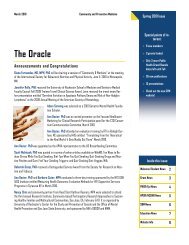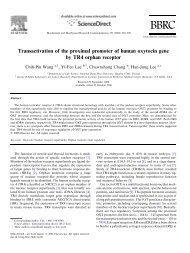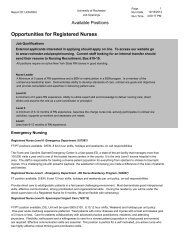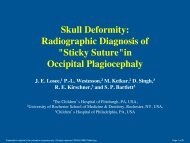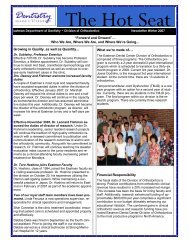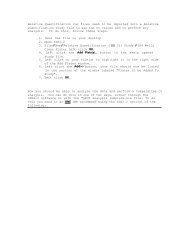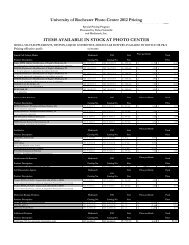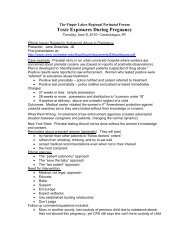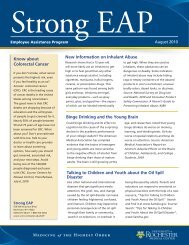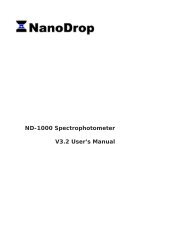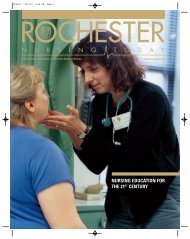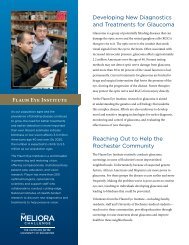Fall/Winter 2006 - University of Rochester Medical Center
Fall/Winter 2006 - University of Rochester Medical Center
Fall/Winter 2006 - University of Rochester Medical Center
Create successful ePaper yourself
Turn your PDF publications into a flip-book with our unique Google optimized e-Paper software.
Huntington’s study examines early stages and decisions<br />
By Tom Rickey<br />
Doctors have completed the first step <strong>of</strong> a<br />
unique medical research study, evaluating<br />
1,001 individuals at risk <strong>of</strong> developing<br />
Huntington’s disease who do not know - nor<br />
do they want to know - whether they carry<br />
the genetic defect that causes the condition.<br />
An international team led by neurologist<br />
Ira Shoulson, M.D., pr<strong>of</strong>essor <strong>of</strong><br />
neurology, is trying to identify the earliest<br />
signs <strong>of</strong> the onset <strong>of</strong> the disease. The information<br />
will help clinicians design better<br />
studies <strong>of</strong> new drugs aimed at alleviating or<br />
postponing illness. It also helps researchers<br />
understand how patients evaluate potentially<br />
life-changing knowledge now available to<br />
them through means such as genetic testing.<br />
Shoulson and colleagues from the<br />
Huntington Study Group reported their<br />
progress on the study known as PHAROS,<br />
or Prospective Huntington At Risk<br />
Observational Study, in the July issue <strong>of</strong><br />
Archives <strong>of</strong> Neurology.<br />
While the gene that causes the<br />
disease is known and can be identified<br />
through a blood test, fewer than one in 10<br />
adults at risk for developing the disease have<br />
chosen to be tested. People at risk but who<br />
have not taken the test have a 50/50 chance<br />
<strong>of</strong> developing Huntington’s. This at-risk group<br />
<strong>of</strong>fers physicians a unique opportunity to<br />
witness the earliest signs <strong>of</strong> the disease,<br />
before anyone knows whether a person actually<br />
has the gene for Huntington’s or not.<br />
In the PHAROS study, one <strong>of</strong> the largest<br />
Huntington’s studies ever undertaken, 1,001<br />
healthy people between the ages <strong>of</strong> 26 to 55<br />
who had at least one parent with the disease<br />
have stepped forward to participate. Patients,<br />
doctors and nurses from 43 hospitals and<br />
medical centers<br />
around North America,<br />
including <strong>Rochester</strong>,<br />
are taking part.<br />
At enrollment<br />
in PHAROS, participants<br />
provide a blood<br />
sample for an analysis<br />
that will show<br />
whether they harbor<br />
the Huntington’s gene,<br />
Ira Shoulson, M.D. though neither they,<br />
the researchers, nor<br />
their physicians will<br />
ever be told the<br />
results <strong>of</strong> the individual tests. Participants are<br />
being evaluated once every nine months for<br />
anywhere from four to 10 years.<br />
Huntington’s is an inherited disorder<br />
that affects about 30,000 people in North<br />
America; another 150,000 people or so may<br />
have the gene that causes the disease. The<br />
defective gene, a sort <strong>of</strong> genetic stutter, leads<br />
to the destruction <strong>of</strong> brain cells, causing<br />
involuntary movements, cognitive problems,<br />
and <strong>of</strong>ten psychological problems like depression<br />
and paranoia. The disease usually strikes<br />
in young to mid adulthood, in a patient’s 30s<br />
or 40s.<br />
The study is relevant for many physicians<br />
and patients who have increasing<br />
access to information about the specific<br />
genetic causes <strong>of</strong> many diseases, even for<br />
conditions like Huntington’s, for which there<br />
is no cure or approved treatment.<br />
“The experience from PHAROS also<br />
informs us how persons at high risk to<br />
develop a disabling genetic disease deal with<br />
lingering uncertainties about their future<br />
health and complex choices about their<br />
participation in research,” said Shoulson, part<br />
<strong>of</strong> a <strong>Rochester</strong> team that treats Huntington’s<br />
patients from more than 200 families.<br />
The Huntington Study Group is a nonpr<strong>of</strong>it,<br />
cooperative group <strong>of</strong> Huntington’s<br />
disease experts from medical centers<br />
throughout North America, Europe and<br />
Australia who are dedicated to improving<br />
treatment for persons affected by the<br />
disease. The group is based at the <strong>University</strong><br />
<strong>of</strong> <strong>Rochester</strong> <strong>Medical</strong> <strong>Center</strong>. More information<br />
is available at<br />
www.Huntington-Study-Group.org.<br />
FALL / WINTER <strong>2006</strong> 35



